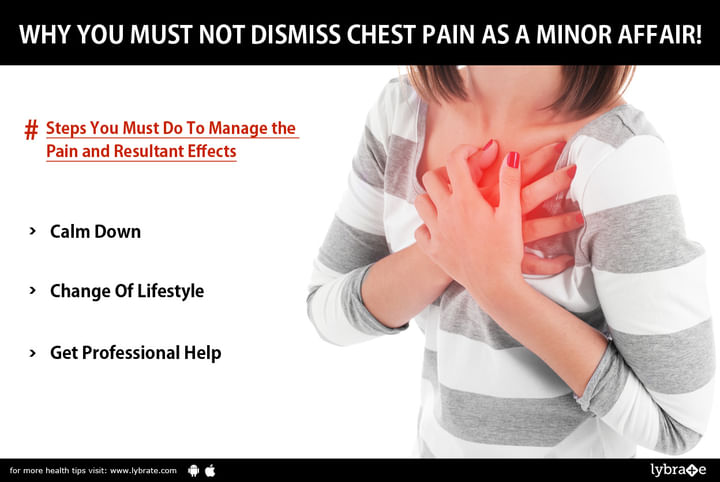Get the App
For Doctors
Login/Sign-up
Last Updated: Nov 12, 2019
BookMark
Report
Why You Must Not Dismiss Chest Pain as a Minor Affair!
Dr. Gaurav MinochaCardiologist • 30 Years Exp.DM - Cardiology, MD, DM - Cardiology, MBBS Bachelor of Medicine and Bachelor of Surgery
Things to do in case of chest pain or angina pain
Unlike yesteryears chest pain or heart related problems aren’t just age related anymore. Many young people under 30 are experiencing chest pain. It seems to be directly proportional to the increasing stress levels.The medical term for mild chest pain is angina pectoris and it happens when your heart is not getting its usual requirement for blood. Such a situation occurs when one or more arteries are blocked. Angina Pectoris is experienced usually while doing physical activities or experiencing strong emotions. At such times, the heart doesn't get as much blood as it requires for normal functioning.
Broadly speaking, discomfort in the upper part of the body is the symptom of angina, the symptoms typically include:
1. It may feel like you are suffering from indigestion or gas or fullness and pressure.
2. It may also feel like chest pain spreading to the neck, back, arms, shoulder or jaw.
3. You feel better after a little rest or some medication.
4. It doesn't last for too long, at the most five minutes.
5. Shortness of breath, anxiety, dizziness, sweating, fatigue and nausea and also symptoms of angina.
Physical conditions and habits which put you at the high risk zone for angina are:
1. When you don't get enough exercise.
2. If you are a smoker
3. If you are overweight
4. If you have a history of heart diseases
5. If you are diabetic
6. If you suffer from blood pressure of high cholesterol
Steps You Must Do To Manage the Pain and Resultant Effects
1. Calm Down - The first thing to do to counter angina pains is to rest and calm down. If you are doing physical activity, stop doing it. And if you are under emotional turbulence, you need to find ways to calm down immediately. Meditate, if needed.
2. Get Professional Help - Do not delay in consulting the doctor and ensure that you take the prescribed medication diligently. In situations where the damage is much more and medications cannot clear the problem, surgery is resorted to.
3. Change Of Lifestyle - In the long run, lifestyle change is a good idea. Staying fit, a clean medical report and keeping a healthy lifestyle will keep enough blood pumping into your heart.
If you would like to consult with me privately, please click on 'Consult'.
From Lybrate: If you found this tip useful, please thank the doctor by clicking on the heart icon below. Also, spread good health by sharing this tip with your loved ones over WhatsApp, Facebook and other media.
Unlike yesteryears chest pain or heart related problems aren’t just age related anymore. Many young people under 30 are experiencing chest pain. It seems to be directly proportional to the increasing stress levels.The medical term for mild chest pain is angina pectoris and it happens when your heart is not getting its usual requirement for blood. Such a situation occurs when one or more arteries are blocked. Angina Pectoris is experienced usually while doing physical activities or experiencing strong emotions. At such times, the heart doesn't get as much blood as it requires for normal functioning.
Broadly speaking, discomfort in the upper part of the body is the symptom of angina, the symptoms typically include:
1. It may feel like you are suffering from indigestion or gas or fullness and pressure.
2. It may also feel like chest pain spreading to the neck, back, arms, shoulder or jaw.
3. You feel better after a little rest or some medication.
4. It doesn't last for too long, at the most five minutes.
5. Shortness of breath, anxiety, dizziness, sweating, fatigue and nausea and also symptoms of angina.
Physical conditions and habits which put you at the high risk zone for angina are:
1. When you don't get enough exercise.
2. If you are a smoker
3. If you are overweight
4. If you have a history of heart diseases
5. If you are diabetic
6. If you suffer from blood pressure of high cholesterol
Steps You Must Do To Manage the Pain and Resultant Effects
1. Calm Down - The first thing to do to counter angina pains is to rest and calm down. If you are doing physical activity, stop doing it. And if you are under emotional turbulence, you need to find ways to calm down immediately. Meditate, if needed.
2. Get Professional Help - Do not delay in consulting the doctor and ensure that you take the prescribed medication diligently. In situations where the damage is much more and medications cannot clear the problem, surgery is resorted to.
3. Change Of Lifestyle - In the long run, lifestyle change is a good idea. Staying fit, a clean medical report and keeping a healthy lifestyle will keep enough blood pumping into your heart.
If you would like to consult with me privately, please click on 'Consult'.
From Lybrate: If you found this tip useful, please thank the doctor by clicking on the heart icon below. Also, spread good health by sharing this tip with your loved ones over WhatsApp, Facebook and other media.



+1.svg)
